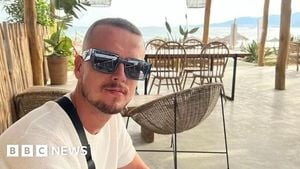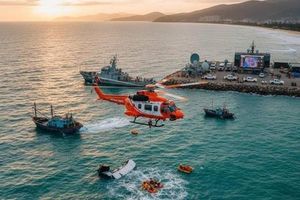For families of Westerners detained in Iran, each passing day brings a fresh wave of anguish, uncertainty, and a sense of helplessness that is hard to put into words. In recent months, the plight of several British and French citizens held in Iranian prisons has drawn renewed attention from governments, rights groups, and the public, as harrowing details of their conditions and the diplomatic deadlock surrounding their cases come to light.
On September 12, 2025, Sky News reported that Lindsay and Craig Foreman, a British couple from the UK, have now been detained in Iran for more than eight months. Their ordeal began in early January, when, as part of an around-the-world motorbike adventure, the couple crossed into Iran from Spain, aiming for Australia. Their journey, which was supposed to be a thrilling chapter in their lives, took a nightmarish turn when they were arrested and charged with espionage—an accusation that has become all too familiar for foreign nationals in Iran.
The Foremans’ son, Joe Bennett, has become the public face of the family’s campaign for their release. In an interview with Sky News, Bennett painted a grim picture of his parents’ daily reality. "They're both coping, making the best of a bad situation. They're in conditions you can't even imagine," he said, describing how his parents have been crammed into cells with more than 50 other prisoners. The couple suffers constant back pain from metal bunk beds stacked three high, and endure unsanitary conditions, frequent power outages, and stifling 50-degree Celsius heat. "The beds are stacked three high. It's unsanitary. It's hot. There are often power outages and they're in 50-degree heat," Bennett explained.
At one point, Lindsay and Craig were held together in a detention facility in the city of Kerman. But in a move that has only deepened the family’s anxiety, the couple was transferred to separate prisons in Tehran. Family members have pleaded with Iranian authorities to reunite the couple in the same facility, but so far, their appeals have gone unanswered. The family’s only direct contact with Lindsay and Craig came during a single, brief phone call. "In a brief conversation that I had with my mum, we managed to share a laugh and a lot of tears as well. But it's a test of time, how long they can keep this up for," Bennett said.
British diplomatic efforts have been slow and, to the family’s frustration, largely fruitless. The British ambassador, Hugo Shorter, was finally allowed to visit Craig after more than four months without contact. During the visit, Craig, despite suffering from untreated dental pain, managed to find a sliver of humor in his situation, joking about becoming a "reluctant Arsenal supporter" while watching football with other inmates.
The UK’s Foreign, Commonwealth and Development Office (FCDO) has expressed deep concern about the Foremans’ fate. In a statement, the FCDO said it "continues to raise this case directly with the Iranian authorities." The family, meanwhile, is urging the British government and the new foreign secretary, Yvette Cooper, to take more direct action to secure Lindsay and Craig’s release and to press for an immediate improvement in their harsh prison conditions. "I need them home, you know, and I need them home as soon as possible. We need them, the family miss them dearly - so we're going to do everything we can to make that possible," Bennett pleaded.
As the Foremans’ ordeal drags on, their story echoes the experiences of other Western citizens held in Iran under similar circumstances. On the same day as the Sky News report, Global Banking and Finance Review relayed that France has renewed its demands for the immediate, unconditional release of three French citizens currently imprisoned in Iran. The French detainees include Cecile Kohler and her partner Jacques Paris, both held since 2022 in conditions France has described as akin to torture, and an 18-year-old French-German cyclist, arrested in July 2025.
French authorities have been clear and firm in their stance. Outgoing French Foreign Minister Jean-Noel Barrot stated, "France demands the unconditional and immediate release of our citizens in Iran and I will make no comment on the remarks of the Iranian foreign minister." Barrot’s comments came after Iranian Foreign Minister Abbas Araqchi suggested on state television that the French nationals could be exchanged for Mahdieh Esfandiari, an Iranian student living in France who was arrested earlier this year over anti-Israel social media posts. "A lot of work has been done regarding Ms Esfandiari's case, and exchanging of her for French prisoners in Iran. We hope that good news will be announced on this matter soon," Araqchi said.
France has flatly rejected the legitimacy of the charges against Kohler and Paris, who are accused of spying and seeking to stir up unrest. The French government has called these allegations baseless and has grown increasingly frustrated by the lack of progress and limited access to its citizens. In response, France has filed a complaint at the World Court, accusing Iran of violating the right to consular protection.
Efforts to secure the release of French and British detainees have been complicated by broader geopolitical tensions. In August 2025, France, Britain, and Germany triggered a process at the United Nations to reimpose sanctions on Iran—a move that has further strained relations and may have reduced the room for diplomatic maneuvering. Iran’s Revolutionary Guards have detained dozens of foreign and dual nationals in recent years, typically on espionage-related charges. Rights groups and Western governments accuse Tehran of using these detainees as bargaining chips in negotiations, a practice Iranian authorities deny.
For many observers, the recurring pattern of foreign nationals being swept up on dubious charges, held in dire conditions, and dangled as potential leverage in international disputes is a deeply troubling one. It raises pressing questions about the safety of travelers, the responsibilities of governments to protect their citizens abroad, and the ethical implications of prisoner swaps that may encourage further detentions.
Behind every headline, however, are real people and families living through unimaginable hardship. As Joe Bennett put it, "I had that natural reaction that some of the public do - why did they go? It's idiotic, you're going against the advice, and it serves them right. That's fair enough when you don't know them [but] just picture your parents having a bit of a sense of adventure… it's a different story."
With diplomatic efforts at something of a standstill and international tensions running high, the fate of Lindsay and Craig Foreman, Cecile Kohler, Jacques Paris, and the young French-German cyclist remains uncertain. Their families, though, refuse to give up hope—and continue to push for a resolution that, for now, remains agonizingly out of reach.




